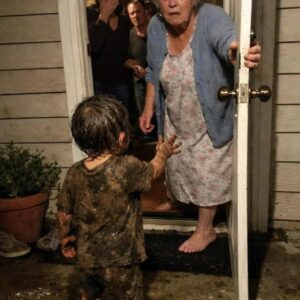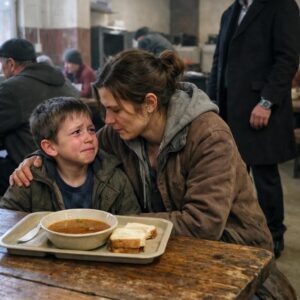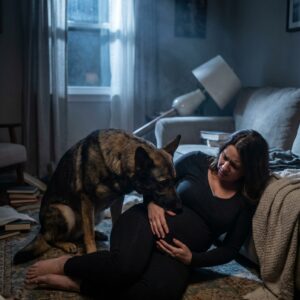The first hit didn’t even hurt.
It was the shock — the sheer disbelief — that stopped Emma’s breath as the fireplace poker connected with her back. A sound left her lips, somewhere between a gasp and a cry, but it was swallowed by the music: “Have Yourself a Merry Little Christmas” playing from the Bluetooth speaker by the tree.
The poker clattered to the floor. The entire Wilson family went still.
Emma stared at the twinkling lights strung along the mantel and thought, So this is how they’ll remember Christmas.
Linda Wilson’s hand still trembled from the swing. Her face, painted in expensive foundation and years of bitterness, twisted into something feral. “You selfish brat,” she hissed. “All this talk about your dream bakery—when your husband’s own brother can’t even buy a house! Family helps family.”
Emma’s voice broke through the shock. “You asked for thirty-eight thousand dollars,” she said quietly. “That’s not helping family, that’s robbery.”
Across the room, Aaron slammed his fist on the table, rattling the cranberry punch. “You’re a Wilson. You owe us!”
“I’m not a Wilson by blood,” Emma said. “And tonight, I’m not sure I ever was by heart.”
The words hit harder than Linda’s swing.
Then came the second blow.
A gloved hand — Charles Wilson’s — shoved Emma backward when she tried to step away. The room erupted in noise: shouts, gasps, the scrape of chairs. Emma fell to her knees, her sweater catching on a splinter of the old oak floor. Children screamed; someone ushered them upstairs.
No one helped her.
Linda lifted the poker again, voice shaking with rage. “You’ll pay us one way or another—”
The front door crashed open.
Cold air swept in, scattering pine needles across the floor.
Three men entered, black coats gleaming with melting snow. The one in front moved like he owned gravity — every step deliberate, the sound of expensive leather against cheap wood.
Leonardo Rossi.
Emma’s father.
He hadn’t been in North Carolina for two years. Not since he’d promised to stay retired, to live quietly, to let the world forget what the Rossi name used to mean in New York. But the world never forgot. And the look on his face now was the reason why.
“Who,” Leonardo said, voice calm and deep, “touched my daughter?”
The room turned into silence itself.
Charles opened his mouth — maybe to lie, maybe to protest — but Leonardo raised one hand. “Think carefully before you answer.”
Linda dropped the poker. It hit the floor with a metallic thud that sounded final.
Leonardo crossed the room in three strides and crouched beside Emma. His hand — broad, warm, protective — brushed her hair back from her bruised cheek. “Sweetheart,” he murmured. “Who did this?”
She tried to speak but her voice failed. “It’s fine,” she whispered instead. “Please, Dad, don’t—”
He stood, the gentleness gone. “It’s not fine.”
He looked at Linda first. “You’re the mother-in-law, yes? The one who likes control.”
Linda swallowed. “It was an accident—”
He turned to Charles. “And you stood by.”
Charles puffed up his chest. “This is our house, Mr. Rossi. We handle our family affairs without outsiders.”
Leonardo smiled, slow and lethal. “Then allow me to introduce myself properly. Leonardo Rossi, the outsider who built his fortune cleaning up other people’s mistakes. And tonight, your mistake is lying on your floor.”
He gestured to one of his men. “Marco. Camera.”
Phones came out. Flashes strobed across the room as photographs captured everything: Emma’s bruises, the poker, the splattered punch, the faces of witnesses too terrified to object.
Aaron lunged forward. “You can’t take pictures here!”
Marco’s partner stepped into his path and said quietly, “Touch that phone and I’ll remind you what a broken wrist feels like.”
Aaron froze.
When the last photo clicked, Leonardo pocketed his gloves. “Everyone here just became part of an investigation,” he said. “You’ll give statements to the police tomorrow. If anyone lies, you’ll give them again — under oath.”
Linda found her voice. “You can’t threaten us!”
“I’m not threatening,” Leonardo said softly. “I’m promising.”
He offered Emma his coat. “We’re leaving.”
As they reached the door, he turned once more. “Expect a visit. From the police, from my lawyer, maybe from me. Decide which scares you more.”
The door closed behind them.
Outside, snow fell soundlessly over the driveway. Emma felt her father’s arm around her shoulders, steadying her as the tears finally came.
“No one touches you again,” he said. “Ever.”
The Morning After
By dawn, the story was already out.
A neighbor had called 911 the moment Leonardo’s black car arrived. By the time officers showed up, they found only a shaken crowd, a bent poker, and a dozen witnesses whispering about a “New York man with eyes like knives.”
Emma spent the night at a hotel under her father’s name. She woke to the scent of coffee and the hum of quiet voices — her father’s men talking logistics.
“We’ll file assault charges first,” Marco was saying. “Then civil suits. The photos are timestamped. The bruises speak for themselves.”
Leonardo nodded. “And the witnesses?”
“Terrified,” Marco said. “They’ll testify.”
Leonardo looked toward Emma’s door. “Good.”
When she came out, wearing a borrowed sweater and moving carefully, all conversation stopped. Her father rose. “How do you feel?”
“Like I ran through glass,” she said with a brittle smile. “But alive.”
“That’s enough for today.” He poured her coffee, adding cream exactly how she liked it — two swirls, no sugar. “Ethan lands this afternoon. I called him.”
Emma’s throat tightened. “He knows?”
“He knows his family crossed a line.” Leonardo’s jaw hardened. “And that line has my name carved on it.”
The Return
Ethan Wilson arrived that evening, eyes bloodshot from the flight. He stopped dead when he saw the bruises on his wife’s arms.
“Emma…”
She met his gaze, weary but calm. “They wanted my savings. I said no.”
He looked at Leonardo, who stood by the window, hands clasped behind his back. “Sir, I—”
Leonardo cut him off gently. “You’ll call me Leonardo. And you’ll sit down before you faint.”
Ethan sat. His hands shook. “I don’t even know what to say.”
“Say nothing,” Leonardo replied. “Do something. Protect your wife. The police are already handling the rest.”
Ethan’s jaw clenched. “They won’t get away with this.”
“They won’t,” Leonardo said. “Not legally. Not socially. And not professionally.”
The Law Moves
The next afternoon, uniformed officers arrived at the Wilson estate. The entire neighborhood watched as Linda and Aaron were escorted out, blankets over their heads like celebrities gone wrong.
Witness statements matched Emma’s account. The poker, dusted for fingerprints, matched Linda’s.
By evening, the story hit the local paper: “Assault Allegations at Prominent Wilson Family Christmas Party.”
Leonardo’s lawyer, a silver-haired woman named Marianne D’Angelo, moved faster than any prosecutor. She filed civil suits for assault, emotional distress, and attempted financial coercion.
Within forty-eight hours, the Wilson family’s social calendar emptied. Sponsors withdrew from Charles’s charitable board. Aaron’s mortgage application was denied “pending review.”
Ethan watched it all unfold in stunned silence. “You planned this,” he said one night.
Leonardo sipped his whiskey. “No. I reacted efficiently.”
The Court
Three weeks later, the Wilsons sat at the defense table, faces pale under fluorescent lights. Emma sat opposite them, her father’s hand resting lightly on hers.
Linda wept. Aaron stared at the table. Charles glared at the floor, too proud to meet anyone’s eyes.
When the judge called the case, Marianne rose. Her opening statement was brief, almost gentle. “This is not a case about money,” she said. “It’s about power. And how it collapses when someone finally says no.”
Emma testified first. Her voice didn’t shake. She described every word, every blow, every silent witness.
When Linda’s lawyer objected — “Isn’t it true Mrs. Wilson merely lost her temper?” — Marianne held up the photos. “Losing your temper is slamming a door, Counselor. This is battery.”
The jury flinched at the images.
Ethan testified next, his voice low. “I thought my family was strict,” he said. “I didn’t know they were cruel.”
By day’s end, the verdict was inevitable. Guilty.
The judge’s orders were swift: restitution for medical costs, mandatory anger-management therapy, and a restraining order.
But Leonardo wasn’t finished.
The Quiet Fall
In the following weeks, subtle things began to happen.
Charles’s company lost a key contract with an international partner — a partner who, coincidentally, owed Leonardo a favor from twenty years ago.
Aaron’s employer “downsized,” his position conveniently eliminated.
The Wilson name, once synonymous with prestige in Asheville, became an unspoken embarrassment.
At every gala, every PTA meeting, every fundraiser, whispers followed: “That’s the family who beat their daughter-in-law.”
Leonardo never bragged. He never raised his voice. He simply made a few calls and let consequences run their natural course.
Emma opened her bakery in March. She called it Second Sunrise.
On opening day, the line stretched down the block. Her father stood by the counter, holding a coffee. “You did this,” he said softly.
“We did,” she corrected. “You taught me that silence protects no one.”
He smiled, pride softening his scarred features. “And you taught me revenge doesn’t always need a gun.”
Outside, snow began to fall again — light, forgiving.
It was Christmas once more.
But this time, the lights were hers.
The Christmas Reckoning — Part 2
Snow came late to Asheville that year, the kind that drifted in slow, deliberate flakes, as if the sky itself wanted to think before it acted.
By then, the Wilson name had already become a cautionary tale.
I. The Fall After the Storm
Charles Wilson resigned from his company “for health reasons.”
Aaron moved to Atlanta, chasing jobs that vanished the moment someone Googled him.
Linda remained in Asheville, reduced to shopping at odd hours to avoid running into anyone who had seen her mug shot printed above the headline “Christmas Party Assault.”
Emma never asked how those consequences found their timing so neatly. She suspected her father’s hand—Leonardo Rossi had always preferred the elegance of invisible strings to overt displays of power. When he visited the bakery, he only ever spoke of espresso blends and sourdough starters, never of bank accounts or contracts quietly collapsing in distant cities.
“Justice is best when it looks like coincidence,” he said once, breaking a croissant in two. “People swallow it easier that way.”
The bakery—Second Sunrise—became Emma’s whole world. It was everything the Wilson house had never been: warm, alive, fragrant with cinnamon and the hiss of the espresso machine. Locals who had whispered after the scandal now whispered about her pastries instead.
By spring, she had six employees and a write-up in the Asheville Chronicle titled “From Victim to Visionary.”
Ethan helped when he could.
Their marriage had survived, scarred but intact, rebuilt on awkward honesty. He had confronted his parents exactly once after the trial, standing in their doorway and saying, “You’re not welcome near my wife or son again.”
Then he’d left without waiting for an answer.
Sometimes, guilt still lived behind his eyes, but Emma never fed it. “We can’t change that night,” she told him. “We can only decide who we are in the daylight.”
II. The Ghosts Who Watched
In August, a stranger began coming to the bakery every Friday morning. Always the same order: black coffee, no sugar, a seat near the window. He never lingered long, but he always left a tip shaped like a folded paper star.
One afternoon Leonardo appeared after closing. “How’s business?” he asked, scanning the register receipts.
“Good. Consistent.”
“Good,” he said, satisfied—and then, after a pause, “You’ve seen the man with the paper stars.”
Emma blinked. “You know him?”
Leonardo nodded once. “He’s there to remind the Wilsons what regret looks like. A private investigator. I hired him to make sure they don’t forget.”
Emma frowned. “Dad, I don’t need watchers.”
“I know,” he said, smiling faintly. “But sometimes they do.”
She let it go. Some ghosts deserved to be watched.
III. Linda’s Apology
Autumn brought tourists and pumpkin loaves—and a letter post-marked from a halfway house.
Emma found it one morning among invoices.
Emma,
I can’t ask forgiveness, only understanding. I was raised to believe family meant obedience. I confused control for love. Your father scared me, but I think he saved us all from becoming worse.
If you ever bake those lemon bars again, think kindly of the fool who didn’t know how to be a mother.
— Linda
Emma read it twice, then placed it in the drawer beneath the till. She neither answered nor destroyed it. Some wounds heal best when exposed to quiet air.
IV. The Invitation
By November, word spread that the local hospital planned its annual charity gala.
For decades, the Wilsons had hosted it; this year, the board asked Second Sunrise to cater.
Ethan hesitated when he showed her the email. “We can decline.”
Emma shook her head. “No. We’ll go. People forget; sometimes they need reminding who we became.”
The event would be held at the Ridgeview Country Club—the same hall where the police had once marched Linda and Aaron out under Christmas garlands.
Leonardo offered to fund the catering costs as a donation. “Call it poetic symmetry,” he said.
V. The Gala
The night of the gala shimmered with polite opulence. Crystal chandeliers. White-and-gold décor. The scent of roasted chestnuts drifting through open doors.
Emma arrived in a black dress—simple, elegant, identical in cut to the one she’d worn the year before when she’d lain bruised on a wooden floor.
Ethan accompanied her, nervous but proud. Leonardo entered later, moving through the crowd like a man no one dared to touch.
Whispers followed them.
That’s her…
The bakery owner? The one whose in-laws—
And the father… is he really…?
Emma ignored it all. She spoke with the mayor, shook hands with donors, and smiled for photos. Each camera flash felt like closure.
Halfway through the evening, she saw them—Linda and Charles—standing by the punch table like ghosts mistaken for guests. Charles looked smaller; Linda clutched her handbag as if it might protect her. They weren’t supposed to be there, but the hospital board had quietly reinstated Charles as a donor. Old money, even tarnished, still bought entry.
Ethan froze when he saw them. “We can leave.”
“No,” Emma said. “We stay.”
Linda noticed them and faltered. Her lips parted, maybe for apology, maybe for self-defense. Before she could speak, Leonardo stepped between them.
He didn’t raise his voice. He didn’t have to.
“Mrs. Wilson,” he said, as if greeting a colleague. “I understand you’ve been attending counseling. I’m glad. They say empathy is a skill you can relearn.”
Linda’s mouth trembled. “Mr. Rossi, please… I never meant—”
“Meaning is irrelevant,” he said. “Only consequence endures.”
He gestured subtly toward Emma, who was serving pastries to a nurse. “See her? That’s what consequence looks like when it stands upright.”
Charles stepped forward. “We’ve lost enough, Rossi. Our reputation, our home—”
Leonardo interrupted with a smile sharp enough to cut reflection. “Reputation isn’t lost, Mr. Wilson. It’s taken. And in your case, I took it.”
Then he bowed slightly, an almost courtly gesture, and walked away.
The room, sensing drama, watched in fascinated silence.
Emma met her father halfway across the floor. “You didn’t have to humiliate them,” she said quietly.
He looked at her, eyes softening. “I didn’t. They did that to themselves. I only held up a mirror.”
VI. A Father’s Gift
In early December, Leonardo came to the bakery carrying a small wooden box. “An early Christmas present,” he said.
Inside lay the deed to the building.
Emma stared. “Dad… no. You already invested in the opening—”
“This isn’t investment,” he said. “It’s independence. You earned it.”
Her eyes blurred. “You always fix things.”
He shook his head. “No, you fixed them. I just reminded the world to pay attention.”
He left before she could thank him again.
Later, when she slid the box under the counter, she noticed a folded paper star beside the till—the investigator’s last calling card. On one side, in her father’s neat hand, were four words: “Debt paid. Case closed.”
VII. The Reckoning
Exactly one year after the night of the assault, snow returned.
Emma closed the bakery early and drove with Ethan to her father’s cabin on the outskirts of town for Christmas Eve dinner. The air smelled of pine and wood smoke. Inside, the table was set for three.
But when the doorbell rang, Leonardo smiled knowingly. “Open it,” he told her.
On the porch stood Linda Wilson, trembling in the cold, clutching a tin of cookies. Behind her, headlights from an old sedan glowed in the dark—Charles waiting at the wheel.
“I know I shouldn’t be here,” Linda said. “But I needed to say it to your face. I’m sorry. For everything.”
Emma looked at her father. His expression gave nothing away.
She turned back to Linda. “I don’t hate you,” she said. “But I don’t need you, either. That’s my forgiveness.”
Linda’s eyes filled. “That’s more than I deserve.”
Leonardo stepped forward, his tone measured. “Mrs. Wilson, understand this: forgiveness is not permission to return. You leave tonight knowing you’ve been heard. That’s all.”
Linda nodded, whispered thank you, and retreated into the falling snow.
When the door closed, silence lingered, heavy and clean.
Ethan exhaled. “That was… unexpected.”
Leonardo poured wine for them all. “Every empire needs its ending,” he said. “Even small ones built on arrogance.”
VIII. The New Year
By January, Second Sunrise expanded into the adjoining storefront. Local colleges invited Emma to speak about resilience. One of her employees, a young single mother, said, “You make it look easy.”
Emma smiled. “It isn’t. I just decided not to let anyone else narrate my life.”
Her father’s health began to fade that spring—quietly, like smoke thinning in the wind. At his insistence, no hospitals, only home. On his last good day, he sat by the bakery window watching snow out of season and said, “Do you remember what I told you when you were little? That revenge can be beautiful if you make it productive?”
She nodded. “You turned it into justice.”
He smiled faintly. “No, you did. I only gave you the tools. Promise me something: never become what we fought.”
“I promise.”
He died two weeks later, leaving her not money but a single sentence in his will:
To my daughter Emma, who proved power and kindness can share the same heartbeat.
IX. One Year Later
Christmas returned with gentler snow. The bakery glowed in the early evening, filled with carols, cinnamon, and laughter. Ethan hung garlands; Nathan carried boxes of cookies to customers.
Emma stood at the window, watching people pass. Across the street, she spotted a familiar figure—Aaron Wilson—carrying groceries, his face older but sober. When their eyes met, he hesitated, then gave a small, respectful nod. She returned it. That was enough.
Ethan came up behind her, wrapping his arms around her waist. “Thinking about last Christmas?”
“A little.”
He kissed her temple. “We survived it.”
“No,” she said softly. “We rewrote it.”
Outside, the church bells began to ring. She looked toward the sky, flakes catching in the streetlights, and whispered, “Merry Christmas, Dad.”
For a moment, she could almost hear his voice: Justice is best when it looks like coincidence.
The lights of Second Sunrise flickered, steady and warm, and the town that had once watched her fall now gathered in her glow.





